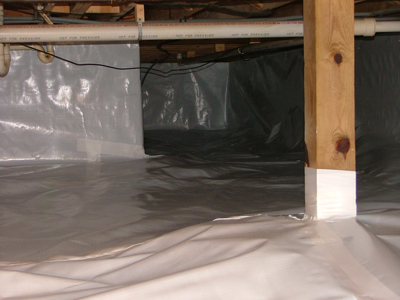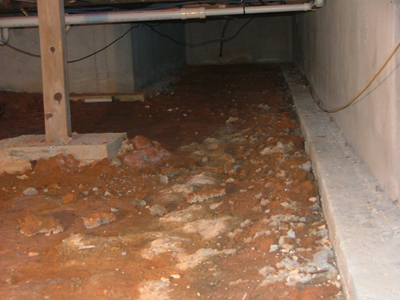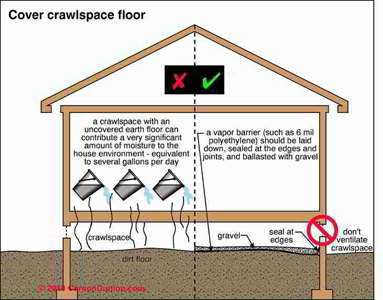Top 5 Reasons Your Crawl Space Needs A Vapor Barrier!
Mold B Gone are crawl space mold removal and crawl space encapsulation professionals. We have been serving the Atlanta metropolitan area since 2009, performing 1000s of jobs.
One of the most common problems we encounter ismold in crawl spaces. The purpose of this article is two fold.
First, we will answer the most common questions asked about crawl spaces.
Second, we will explain why crawl space encapsulation is so important by listing and explaining the top 5 reasons your crawl space needs a vapor barrier.
Frequently Asked Questions About Crawl Spaces!
If you look into your crawl space, you may notice standing water, moldy insulation, or a bad smell. Listed below are the top questions we encounter about crawl spaces.
1. Why Does My Crawl Space Get Wet?
Your crawl space could be wet for several reasons:
- Cracks in the foundation or walls allow water and moisture to enter your crawl space.
- Improper ventilation can allow moisture in.
- Poor drainage systems also allow moisture and water in.
- Poor maintenance and not sealing the dirt floor is another common reason your crawl space is wet or damp.
2. Why Should I Be Concerned About A Wet Crawl Space?
There are two key problems caused by wet or damp crawl spaces.
First, if your crawl space has standing water or is damp, this will encourage the growth of mold and mildew.
Second, the excess moisture and mold will also cause wood rot and structural deterioration.
3. Will Vents Keep My Crawl Space Dry?
No!
Unfortunately, vents will not keep your crawl space dry.
Moisture and humidity can still accumulate in your crawl space, which in turn will lead to mold and wood rot.
In addition, often times the air flow is impeded when the vents get blocked by plants or other object outside the vent. When this occurs, water that collects around the home or drips down the exterior walls can enter your crawl space creating moisture problems.
4. Can The Air In My Crawl Space Enter My Home?
Yes!
A large percentage of your home’s air, 40% or more, comes from your crawl space.
Air in your crawl space seeps up into your home through the floors, and around heating and air ducts.
The air quality of your crawl space can have a negative impact on your home if there is excess moisture and mold.
Common health issues caused by poor crawl space air include headaches, fevers, and respiratory problems.
5. What Should I Do To Keep My Crawl Space Dry?
If your crawl space is wet, the following steps must be taken.
- All moisture and water must be eliminated.
- Wet insulation and standing water needs to be removed.
- The ventilation system must be inspected to ensure it is working efficiently. If not, it needs to be fixed.
- The next step is to figure out why you have a moisture problem in the crawl space by finding and fixing any cracks, holes, leaks, or damage to the walls, ceiling, and floors.
- The final step is to seal up the damaged areas and install fresh insulation, and most importantly install vapor barrier, which is explained in greater detail below.
Now that you have answers to the most common questions we encounter about crawl spaces, the remainder of this article will explain why the installation of vapor barrier is so important.
Five Reasons Your Crawl Space Needs A Vapor Barrier!
#1: Keep Moisture in the Soil!
According to the EPA, a vapor barrier will keep your home drier and is especially recommended for older homes to control dampness. In Atlanta, where humidity is a big issue, your crawl space likely has moisture and damp issues and a vapor barrier will help keep the moisture down because it will prevent moisture from escaping from the soil.
Installed correctly and spread uniformly across the soil and the the walls of your crawl space, the vapor barrier creates a barrier between moisture and your home.
#2: Prevent Ductwork from Rusting and Corroding
Most homes with crawl spaces have ductwork running underneath their home, and many have their HVAC system installed under the house as well.
It is important to keep moisture at a minimum to prevent metal from rusting and corroding.
#3: Prevent Wiring Hazards
Many crawl spaces also have wiring. Water and electricity do not mix well. Accumulation of excess moisture is a potential fire hazard and could create an unsafe environment for anyone that enters the crawl space.
#4: Keep Your Home Dry
Since excess moisture in your crawl space can enter your home through the floor boards, keeping the moisture to a minimum will also help maintain moisture levels in your home.
In addition to a damp free home, a vapor barrier will also reduce your utility bills because your air conditioner will operate more efficiently.
The risk of excess dampness and moisture in your home is mold. If your crawl space is wet and that moisture enters your home, you will not only have mold problems in the crawl space but your home.
As mentioned earlier, mold can cause health problems; moisture control is imperative in both your home and crawl space.
#5: Keep Your Crawl Space Clean
Your crawl space is an area of your home that you can potentially use for storage. In order to ensure that your crawl space is a safe and clean environment, a vapor barrier will reduce moisture and also keep the area clean and less inhabitable for rodents and insects.
If you plan to use your crawl space for other uses, such as storage, we recommend that you use a stronger and thicker barrier.
The most important role that a vapor barrier plays is keeping the moisture in the soil. At the same time, it will help maintain a cleaner and safer environment for you, should you choose to use it for storage or other uses.
Got Crawl Space Questions?
If you have questions about your crawl space, please give us a call or send us an e-mail. We look forward to serving you! 🙂
Top 5 Ways Your Crawl Space Affects Your Home Infographic
Why Do #CrawlSpaces Need A Vapor Barrier? https://t.co/79LTv2aCcq PLEASE RETWEET #moldprevention pic.twitter.com/hxZ1usRyS6
— Mold B Gone (@moldbgonega) June 23, 2016





